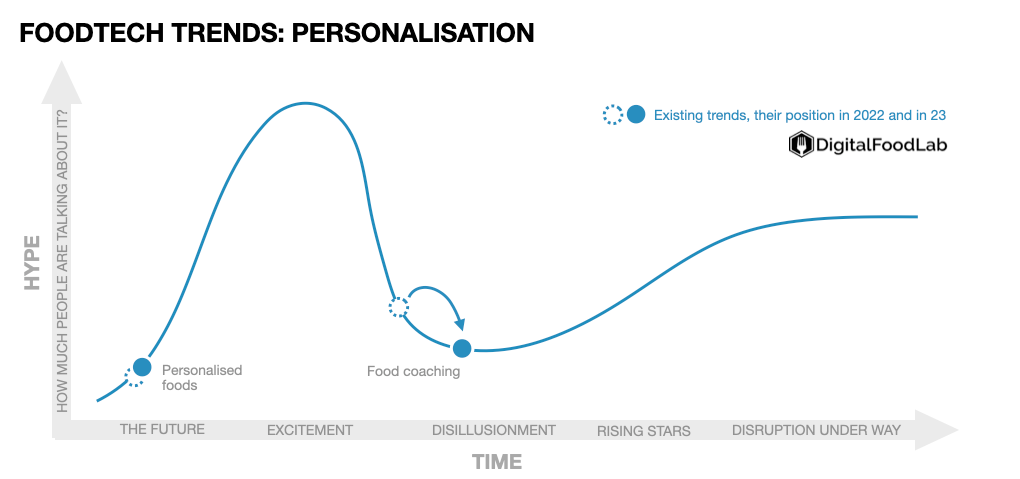Personalisation may be our favourite “megatrend” at DigitalFoodLab. While we feel it may be the most disruptive impact on our lives and the food system, it is also the least active. Indeed, while many startups and researchers are looking into the space, things are not really moving forward.
What is personalisation about?
As for many disruptive trends, the promise is simple to state and extremely hard to achieve. Personalisation means two things:
- knowing our individual needs: basically, each of us has different needs in terms of diet. It may go from avoiding certain types of ingredients to the kind of diet (rich in carbs or fat). These “needs” are related to our short-term energy level, microbiome state, weight, long-term health predispositions, and, eventually, life expectancy.
- being able to act on this information by eating the right foods, adding personalised supplements, and knowing which types of activities are best suited at each moment.
Why is it important?
Such considerations make many people uneasy, notably “functional food”. However, let’s consider some facts:

First, diseases, deaths and the rising costs of avoidable conditions can be directly related to food. For example, we can consider the increasing number of obese people, which has risen constantly over the past decades. It is even anticipated that more than half of the world’s population will be overweight by 2035. In developed economies, obesity will go above 40% (and 58% in the US). Beyond the human cost, this strains our economies and health systems. The last World’s obesity report predicts that in 2035, the yearly cost of overweight people could be above $4T (T as trillion, i.e. thousands of billions). In comparison, that’s Germany’s GDP, and that’s only one of the many food-related conditions.
In the meantime, we know perfectly well what we should be doing. There is now a wealth of research showing that simple changes in our diet could dramatically impact our health. As shown in the graph above, an average Westerner of 50 years old could increase their life expectancy by 12.5 years by changing their diet behaviour.
So, on the one hand, we know what we should do, and we collectively do the opposite. It is not unlike climate change and meat consumption: more people are aware of the link between the two, but they keep eating more meat.
Personalisation is here to solve this problem by helping consumers on three levels:
- giving them individual information. Our relationship with what we eat will be changed if we know that eating this or that food will directly impact our health.
- offering personalised advice on how to move from their current diet to an optimal one.
- creating easy-to-use personalised food products and supplements.
Where are we?
However, right now, we are still blocked at the first stage, as we don’t know how to combine all the information provided by DNA tests, Microbiome tests, Glucose monitoring devices, and other tests.

As you can see on the innovation curve, personalised foods have barely moved from last year. Food coaching apps are in the pit of disillusion. The years when the “quantified self” was one of the hottest topics seem far away.
So, what’s next?
The situation is not as bad as it looks on the graph. We are observing two exciting trends:
- Continuous Glucose Monitoring (CGM) startups, like Veri or Levels, are rising. Glucose is trending right now, somehow as a diet fad but also as a way to boost our metabolism and, in some cases, to manage pre-diabetes. Compared to DNA or microbiome, tracking and acting on is super simple. However, most devices rely on small trackers using a needle. This remains a deterrent for many people. Things could change dramatically if, as rumoured, Apple introduced a non-invasive CGM in its Apple Watch in a couple of years. Then, tens of millions of people would have access to this information and be looking for advice, foods and supplements to manage their glucose levels.
- The merge between health and food. Many startups in this space are moving toward health. This is notably the case of Viome, which is evolving from microbiome tests toward cancer early detection. We believe that the integration between health and food, and the implication of healthcare companies in this space, could help to boost food personalisation.
In a word, we are far from the promise of food personalisation. But should entrepreneurs, investors and large companies ignore this space? I don’t think so, notably for the latter category. When personalisation will “becomes a thing”, they will need to be ready to have established partnerships and to have a clear view of how their products and business models will have to shift. That’s not something you can plan overnight.







